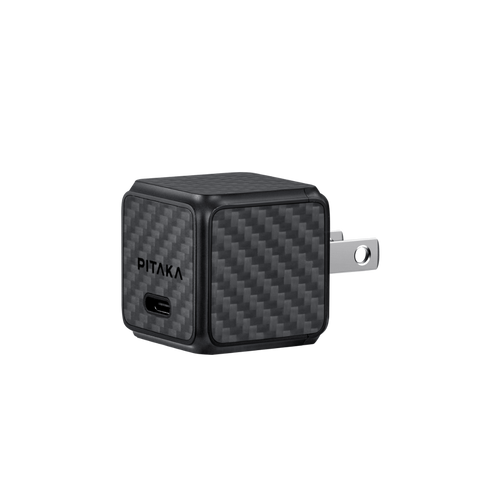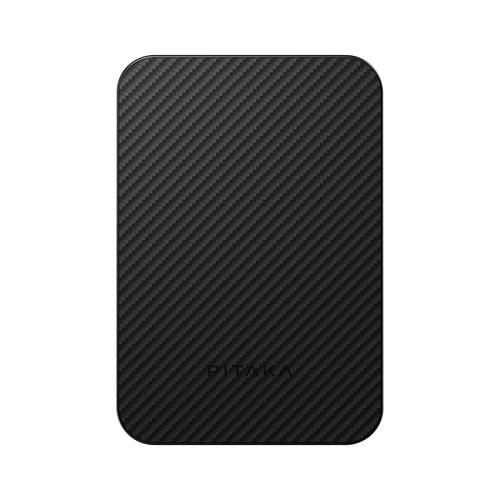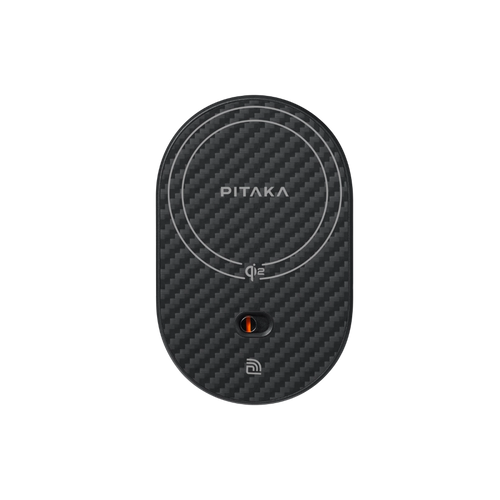Power banks are one of those everyday gadgets we rely on when we need to stay connected but don't have access to an outlet. Whether you're on a road trip, at work, or traveling, a power bank can be a lifesaver.
But with so many options out there, with capacities ranging from 500mAh to 30,000mAh, how do you choose the right one?
And more importantly, how do you know how long it will last, or how many times it will charge your devices?
1. What Does A Quality Power Bank Look Like?

The easiest and quickest way to judge the quality of a power bank is to check the quality of its case. What materials are used? How well is it designed? Are there any signs of damage? Is the button easy to press?
A quality power bank should have:
1) A clean and complete surface, nothing out of shape. There should be no signs of mechanical damage, and no corrosion on any of the connectors.
2) Clear markings about the power ratings, avoid anything blurry that you cannot read.
3) Make sure any buttons and lights work correctly.
2. A Power Bank Should Have These Numbers
Every power bank should have markings that clearly state what the power ratings are. That will help you to understand if it can properly charge your phone or not.
1) The basic information should be illustrated on the product or in the user manual; this usually includes the capacity, model number, product type, manufacturer’s information, etc.
2) The Rated input voltage/current and the output voltage/current information are fundamental. But what do these numbers mean?
The rated input tells you the standard voltage that the power adapter can connect to so that it can charge the power bank.
If you lose the original power adapter, you could buy a third-party one that matches instead of the original. The rated output has to match the output voltage of the original power adapter for your phone. It’s not recommended to charge your phone with a power bank that has different voltages; otherwise, you may well damage your phone.
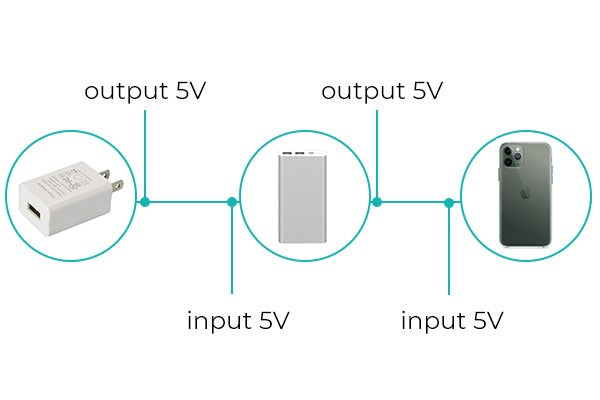
3) How many times can the full power bank charge my phone?
That’s the question a lot of you will want to know. Usually, that sort of information is not written on the power bank, but with rated capacity and cell/battery rated energy, you can do the math yourself. Don’t worry. We will get to that later.
4) Last but not least, the markings about safety certification are also significant.
Most electronics products will bear signs of CE, RoHs and FCC. CE and RoHs are required if the product is sold in the EU; while FCC is mandatory for the US market. Safety is somehow guaranteed if you see those marks on the power bank.
You will probably find other markings too, such as environmental information. If you are passionate about these environmental factors, you might want to choose a power bank with a ‘cyclic regeneration mark’ which means that it is recyclable.
3. Know the Conversion Game of Power Banks
You probably know that bigger capacity is better since it can provide more energy. The thing is, there are two different types of capacity: battery capacity and rated capacity. What you usually see on power banks is the battery capacity. What’s the difference between those two numbers? Let’s read on.
1) How many times can a power bank charge your phone?
Take a power bank marked as 10,000mAh 3.8V (38Wh) for example. Its battery capacity is 10,000mAh, the voltage of the battery core is 3.8V, and the battery core energy is 38Wh.
Rated capacity (mAh): Also known as nameplate capacity, is the least output capacity under the rated voltage and current.
If the rated capacity of the power bank is 7,000mAh (TYP5.1V 1A), it means the minimum output capacity of the power bank is 7,000mAh in the charging process with 5.1V and 1A output standard.
Conversion efficiency: This indicates the value difference between the battery core energy and rated capacity.
A power bank has a battery capacity of 10,000mAh; the battery core voltage is 3.8V, which will increase to 5.1V when it’s charging a phone. So, in theory, its output capacity is:
10,000 * 3.8 / 5.1 = 7,450mAh
The rated capacity is 7,000mAh (TYP5.1V 1A), so the rated conversion efficiency is:
7,000 / 7,450 = 93.96%
In other words, the energy conversion efficiency is about 93.96%, with a 5.1V 1A output standard. About 6.04% of the power is lost in the conversion.
If you use professional tools to test the rated output capacity, the result would not be too different. The conversion efficiency of most of the power banks on the market is between 80~90%. Therefore, a power bank with 10,000 battery capacity has about 6,000~7,000 rated output capacity.
Charging rate: 7,000mAh (rated capacity of the power bank) / 3,110mAh (capacity of the iPhone 11 battery) =2.25 times
And if your phone battery is 5000mAh, a 10000mAh power bank can charge your phone for 1-1.5 times.
2) How long will a power bank last?
The lifespan of a power bank depends on two things: how well the power bank is made and how much you use it.
The number of charge-discharge cycles, decided by the battery core and other vital components, varies amongst power banks. Typically, this is between 300 ~ 1,000 cycles and if you want my advice, you should definitely avoid any power bank that has less than 500 charge cycles.
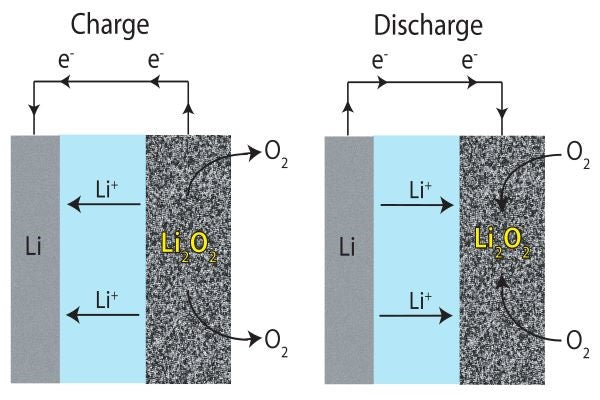
Say, the power bank has 500 charge cycles, and you fully charge it once per day on average, then how long will it last? We can work that out with the following simple formula:
Power bank lifespan = Charge cycles * charging rate / using rate
Where ‘Using rate’ is the number of times you charge the power bank fully in a day.
As mentioned above, for a 10,000mAh power bank, its charging rate is about 2.25. If it has 500 charging cycles, its lifespan is:
500 * 2.25 / 1 = 1125 days = 3.08 years
But where can these charging cycles be found, you may ask? The test of cycle life involves specific equipment, so for now, we’ll just have to skip that.
But, if you really want to know, ask the seller before you purchase. Even if you don’t get an answer, as you can see from the above example, the power bank will last longer if it has more capacity and a lower use rate. So, it makes sense to go for a big power bank and use it slowly, that way, you should be able to keep it for a couple of years if not more.
3) How long does it take to charge a power bank or a phone fully?
Now comes the easy part. The charging time depends on the capacity of the powered device (PD) and its input current, which equals the output current of the power sourcing device (PSD)
Charging time = battery capacity / actual input current.
Take a 10,000mAh power bank to demonstrate. Its rated input is 5V/2A, so if you use a 5V/1A power adapter to charge it, its actual input current is 1A=1,000mAh. 10,000mAh /1,000mAh=10 hours. If you use a 5V/2A power adapter, it takes 5 hours to fully charge the power bank: 10,000mAh / 2A (2,000mAh) = 5 hours.

Same for charging the phone. If your phone battery has 4,000mAh capacity, and the maximum output current of the power bank is 2.5A (input current for the phone is 2.5A) then it takes about 1.6 hours to fully charge your phone with the power bank.
4. Is It Safe to Use a Power Bank?
You cannot be too careful with electronic devices, including power banks. They should have protection mechanisms to prevent any danger caused by electricity.
There are several underlying protection mechanisms: over-current protection, under-voltage protection, short-circuit protection, over-temperature protection, and overvoltage protection. This information can usually be found in the user manual.

5. What’s the Purpose of Power Banks?
By now, you are probably a power bank expert to some extent. But can you count on all those numbers to consider a purchase?
Not really. Knowing everything about a power bank can help you decide the quality, but the quality is not the only standard to define a “good” product. It also has to do what you want.
Yes, high-capacity power banks have a longer lifespan and higher charging rate, however, a high capacity also means a bigger size.
Do you want to carry a bulky phone power bank in your small bag? Some of you will be shaking your head.
If you want to carry an emergency power supply for your phone when you are out shopping, then a small-sized power bank is best. However, if you are a selfie addict, an extra 30% energy from the power bank may not be enough for your day out. You see, everyone has different needs.
Therefore, the first step to selecting a power bank is to figure out what kind of power bank you want, then compare power banks of the same type with what you’ve learned above.
If you happen to be looking for a power bank for an emergency power supply, check out this recommendation –
PITAKA Aramid Fiber Magnetic Power Bank, a MagSafe battery pack that enables Qi2 wireless charging

The power bank is a perfectly formed, small-sized, wireless power bank with 5000mAh capacity that can provide additional energy for your phone, perfect for your everyday carry and emergency use.
With magnets embedded within, it can securely attach to your iPhone 12, iPhone 13, iPhone 14 series, iPhone 15 series, and iPhone 16 series, and also work with most phones using a MagSafe phone case, charging your phone on the go.
In conclusion
You don’t have to be a tech guru to select what you want, but you should know the essential tech behind a power bank if you are going to buy one. Don’t be fooled by the salesman, do your research and you have a bigger chance to get a power bank that’s worth it. Nothing could go amiss.







